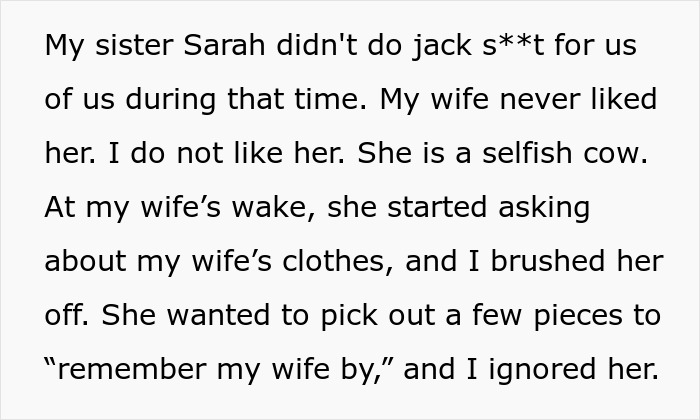Grieving the loss of someone you love is hard enough on its own, but sometimes, people can make an already painful situation even worse.
That’s exactly what happened to a man who recently shared his story on Reddit. After losing his wife to a tough battle with cancer, he faced an unexpected demand from his sister—a woman neither he nor his late wife were particularly fond of. She insisted on taking some of his wife’s clothes, and when he refused, a full-blown tantrum ensued. Read on to see how he responded.
After losing his wife to cancer, the man was deep in grief

Image credits: cottonbro studio / pexels (not the actual photo)
But things got worse when his sister, rather than comforting him, insisted on taking some of his late wife’s clothes






Image credits: YuriArcursPeopleimages / envato (not the actual photo)


Image source: ProudFormal8139
There is no “normal” way to grieve
Some might think OP was right not to give his sister his late wife’s clothes, while others might feel he overreacted and could have resolved things by giving her a few items. But what this story really shows is that grief is a deeply personal experience, and everyone handles it differently.
It’s not unusual to feel cheerful or in denial, or to face anger and anxiety. Changes in appetite, like not eating at all one day and overeating the next, are also normal. Sleep patterns can fluctuate, and feelings about a loved one’s belongings can differ too—some people cling to them, while others prefer to let them go. In other words, swinging between different behaviors is simply a part of the grieving process.
All this makes sense when you consider how our minds and bodies are adjusting to life without a loved one. Clinical psychologist Mary-Frances O’Connor says that grieving can be thought of as learning. “The background is running all the time for people who are grieving, thinking about new habits and how they interact now.”
As O’Connor points out, in any close relationship, our sense of self is closely tied to the other person. The “we” in our lives is just as important as the “you” and “me.” So, when people say, “I feel like I’ve lost part of myself,” it’s a genuine feeling. Our brains process the “we” just as strongly as the “you” and “I,” which is why finding ways to move forward can be such a challenge.
Since grief is such a complicated emotion, it can last for unexpected lengths of time and come up at random moments. For some, it may be short-lived, while for others, it might stretch over months or even years, a phenomenon known as delayed grief. If you’re caring for someone who’s very ill, you might experience anticipatory grief, where you start feeling the loss even before their passing.
So, instead of criticizing how someone copes, remember they are navigating a tough new reality. “We need to normalize grief in all its forms and be curious about the experiences of others before making judgments,” says mental health counselor Hannah Mayderry.
The best way to support a grieving person is to acknowledge their feelings without being overbearing. “I think when you care for someone who is going through this terrible process of losing someone, it really is more about listening to them and seeing where they’re at in their learning than it is about trying to make them feel better,” O’Connor believes.
“The point is not to cheer them up. The point is to be with them and let them know that you will be with them and that you can imagine a future for them where they’re not constantly being knocked over by the waves of grief.”
Most commenters showed their support for the man and offered their heartfelt condolences






















However, a few felt that OP was acting immaturely









